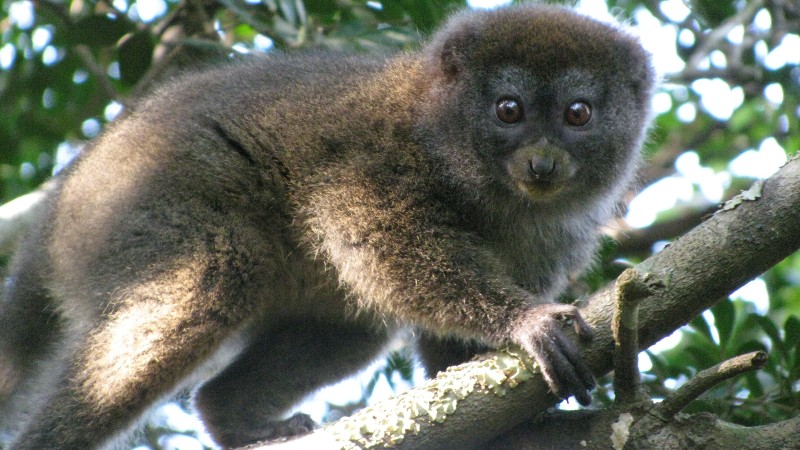Research shows bamboo lemurs can plan and navigate routes through dense forest in search of food

Researchers at Oxford Brookes University have discovered that lemurs are able to memorise complex environments and strategically plan routes to find food through everchanging and dense forests.
While it is well known that great apes and monkeys possess cognitive maps to quickly and efficiently get around their home ranges, navigation strategies have been largely understudied among our distant primate cousins, the lemurs of Madagascar. In particular, lemurs that rely seasonally on leaves and grass are thought to face minor challenges as they never have to travel far to find a meal.
Led by PhD student Bethany Watkins and Dr Giuseppe Donati of Oxford Brookes University, Dr Miguel de Guinea of The Hebrew University of Jerusalem and Dr Timothy Eppley of San Diego Zoo Wildlife Alliance, the team followed bamboo lemurs from sunrise to sunset for approximately 1,762 hours over one year. This involved both direct observation on the ground and radio-tracking and gps localisations.
The nutritional compounds of the food that lemurs ate during the day was also analysed to examine how the diet may influence their navigational strategies
The team’s findings revealed that bamboo lemurs were able to assess the seasonal challenges of the forest, and plan their routes accordingly.
Lemurs adapt their routes throughout seasonal change
The research demonstrated that the bamboo lemurs use a combination of navigation strategies to face up to seasonal challenges. The lemurs follow either established routes or compute novel paths depending on resource availability so that foraging efficiency is maximised.
Lead author and PhD Student Bethany Watkins of Oxford Brookes University said: “This combination of navigation strategies is a fascinating look at how some lemurs cope with seasonality, and may be a critical skill for this species’ survival as Madagascar’s seasons become increasingly unpredictable in the face of climate change.
“Such information is vital for understanding the cognitive evolution of primates, and the lemurs’ blend of strategies demonstrates a cognitive adaptation for coping with Madagascar’s seasonal resource variability.”
Bamboo lemurs’ spatial skills more sophisticated than initially believed
Dr Giuseppe Donati, Reader in Primatology at Oxford Brookes University, with 25 years’ experience working on lemurs’ ecology, said: “These findings challenge previous research postulating that leaf-eating lemurs have constrained spatial skills. Moreover, the bamboo lemurs increased their linear movement during periods of resource abundance when feeding on energy-rich food, presumably to maximise their energy intake.
“This work suggests that the lemurs’ spatial mind is more sophisticated and flexible than previously known and their navigation abilities compare with those of monkeys and apes.”
The paper ‘Routes matter: the effect of seasonality on bamboo lemur navigational strategies.’ is published in Animal Behaviour
The paper is authored by Watkins B, de Guinea M, Poindexter SA, Ganzhorn JU, Donati G, Eppley TM (2022)
Image: A southern bamboo lemur in the Mandena forest, southern Madagascar (Image credited to Timothy Eppley)
